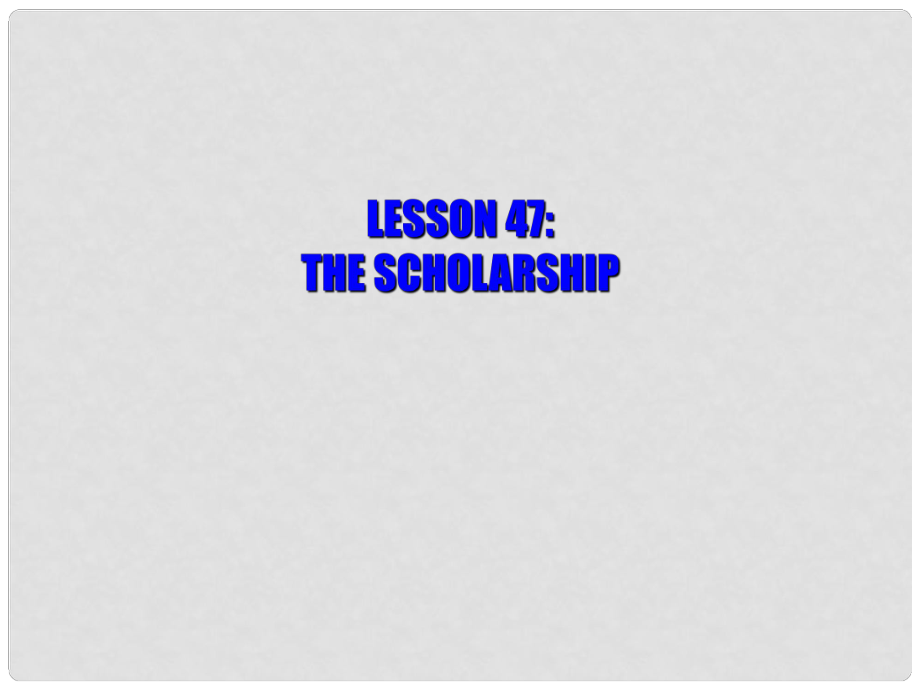《陜西省漢中市陜飛二中九年級(jí)英語下冊(cè) Unit 6 Get Ready for Jobs Lesson 47 The Scholarship課件 冀教版》由會(huì)員分享����,可在線閱讀,更多相關(guān)《陜西省漢中市陜飛二中九年級(jí)英語下冊(cè) Unit 6 Get Ready for Jobs Lesson 47 The Scholarship課件 冀教版(17頁珍藏版)》請(qǐng)?jiān)谘b配圖網(wǎng)上搜索�。
1、 WARMING UP What is a scholar ship?HAVE YOU EVER GOT A SCHOLARSHIP?WHAT SHOULD YOU DO IF YOUR FRIEND GETS A SCHOLARSHIP?WHAT SHOULD YOU DO TO GET A SCHOLARSHIP? award v. 頒發(fā)�;判定頒發(fā)�����;判定 comforting adj. 舒適的舒適的;愉快的愉快的 argue v. 爭(zhēng)論��;爭(zhēng)吵爭(zhēng)論���;爭(zhēng)吵 nod v. 點(diǎn)頭點(diǎn)頭 forehead n. 前額前額 excuse n. 借口借口 make an excuse chore n. 瑣
2、事瑣事 do some chores anger n. 憤怒憤怒 forget his anger vacation n. 假期假期 spend my vacation pancake n.烙餅烙餅 expect v. 期待�����;盼望期待���;盼望 expect to do NEW WORDSFind the phrases1.把信封翻過來把信封翻過來2.再三再三/反復(fù)反復(fù)3.別動(dòng)我的東西別動(dòng)我的東西4.考慮邁克的感覺考慮邁克的感覺5.那么想學(xué)音樂那么想學(xué)音樂6.同時(shí)同時(shí)7.熨些東西熨些東西8.把某人單獨(dú)留下把某人單獨(dú)留下9.為自己選擇為自己選擇10.練習(xí)小提琴練習(xí)小提琴1.turn the enve
3�����、lope over2.again and again3.leave my things alone4.think about Mikes feelings5.want to study music so much6.at the same time7.do some ironing8.leave sb. alone9.choose for myself10.practise the violin11.考慮的一些事考慮的一些事12.回來渡假回來渡假13.找我來幫忙找我來幫忙14.編一個(gè)借口編一個(gè)借口15.做一些家務(wù)做一些家務(wù)16.草莓烙餅草莓烙餅17.厭煩厭煩18.So is Aunt Mary
4、.19.wont have to 11.Here is something to think about. 12.Come back for holidays13.Come to me for help14.make an excuse15.do some chores16.pancakes with strawberries17.get sick of18.瑪麗姑姑也在這瑪麗姑姑也在這19.不必不必READING Read the text and decide the following statements are true or false. 1. Mike opened Angies
5���、 letter from Toronto. 2. Mike liked to say goodbye to his sister at first. 3. Aunt Mary helped Angie happily. 4. Mike liked to eat pancakes that his sister made.LANGUAGE NOTESLeave my things alone. 別動(dòng)我的東西。leavealone不管���,不理��,聽其自然We cant leave the baby alone. 我們不能不管這個(gè)嬰兒。Leave sth aloneLeave sb aloneLeave
6�、 sb by oneselfDont shout at me! 別沖我喊。別沖我喊��。shout to表示與距離某人較遠(yuǎn)表示與距離某人較遠(yuǎn),為了人為了人對(duì)方聽清楚而大聲說話��。對(duì)方聽清楚而大聲說話���。shout at sb. 一般表示因生氣而對(duì)某人大喊大叫一般表示因生氣而對(duì)某人大喊大叫,帶帶有感情色彩�����。有感情色彩。Because of the heavy wind, he had to short to his father loudly. 因因?yàn)轱L(fēng)大��,他不得不向他父親大聲喊�。為風(fēng)大�,他不得不向他父親大聲喊。Who did she respect most? 她最尊敬誰呢�����?她最尊敬誰呢��? respe
7�、ct vt. 尊敬�����;尊重尊敬;尊重 I respect his courage. 我敬佩他的勇氣����。我敬佩他的勇氣�����。 Ill respect your wishes. 我尊重你的愿望。我尊重你的愿望���。 n. (與(與of, for連用)連用)尊敬;尊重尊敬����;尊重 Show respect to those who are older 尊敬長(zhǎng)尊敬長(zhǎng)者者 The students have great respect for their history teacher. 學(xué)生們非常尊敬他們的歷史老學(xué)生們非常尊敬他們的歷史老師。師����。 pay (have) respect to 關(guān)心�����;注意關(guān)心�;注意 .
8、Mike is always arguing with you. 邁克總是和你爭(zhēng)吵����。邁克總是和你爭(zhēng)吵�。 be always doing sth.意為意為總是做某事總是做某事�,說話者往往包�����,說話者往往包含有贊賞�、厭惡����、責(zé)備等某種感情色彩含有贊賞��、厭惡��、責(zé)備等某種感情色彩如如Mr. Smith was fed up with their neighbour Misha because he was always borrowing things from him. 史密斯先生對(duì)他的鄰居米沙非常反感��,因?yàn)樗偸窍蛩枋访芩瓜壬鷮?duì)他的鄰居米沙非常反感�,因?yàn)樗偸窍蛩钖|西�����。東西。 If she kne
9��、w about your scholarship, she would be very proud. 如果她知道你得到了獎(jiǎng)學(xué)金,他會(huì)非常驕傲的����。 1)proud“自尊的�����、自重的”�����,含褒義��。例如: She is too proud to play such a joke on you.她很自重�,不會(huì)跟你開這種玩笑��。 2)proud“驕傲的��、妄自尊大的”���,含貶義。例如: He is too proud to join our party.他太驕傲了�����,不屑參加我們的舞會(huì)�����。 3)proud“自豪的��、得意的自豪的���、得意的”,與���,與of��、不定式或、不定式或that從句連用�����。例如:從句連用���。例如: We a
10����、re proud of our country. 我們?yōu)槲覀兊膰叶院?�。我們?yōu)槲覀兊膰叶院馈?He is proud that he has such a great mother who is fighting with SARS as a doctor.他為自他為自己有一個(gè)醫(yī)生母親而自豪��,她正與己有一個(gè)醫(yī)生母親而自豪,她正與SARS病魔作斗病魔作斗爭(zhēng)��。爭(zhēng)�。 4)proud“輝煌的��、壯麗的��、宏偉的輝煌的�、壯麗的����、宏偉的”。例如:�。例如: I like this proud and high building.我喜歡這座我喜歡這座宏偉的摩天大樓�。宏偉的摩天大樓�。 be proud of“
11�、尊重尊重”,含褒義�;而,含褒義�;而be proud about“自己覺得了自己覺得了不起、盛氣凌人不起����、盛氣凌人”���,常含貶義��,例如:常含貶義�,例如:He is proud about his knowledge.他自以為他的知識(shí)了不起���。他自以為他的知識(shí)了不起。I think you are making an excuse. 我想你正在找借口�。我想你正在找借口���。make an excuse for. 為為.找個(gè)借口找個(gè)借口 Mary made an excuse for not doing her homework. 瑪麗為她沒瑪麗為她沒完成作業(yè)找了個(gè)借口���。完成作業(yè)找了個(gè)借口。Translat
12�����、e the sentences 1.1.在桌子上她看見一封來自于多倫多大學(xué)的信在桌子上她看見一封來自于多倫多大學(xué)的信 2.2.你已經(jīng)獲得了來我校學(xué)習(xí)小提琴的獎(jiǎng)學(xué)金你已經(jīng)獲得了來我校學(xué)習(xí)小提琴的獎(jiǎng)學(xué)金. . 3.3.帶著一本舊相冊(cè)回來了帶著一本舊相冊(cè)回來了 4.4.她把她的手放在他的額頭上她把她的手放在他的額頭上 5.5.我期待每周兩封信我期待每周兩封信On the table , she saw an envelop from a university in Toronto.You have been awarded a scholarship to study violin at our School of Music.Come back with a book of old photogaphs.She put her hand on his forehead.Ill expect two letters every week.
 陜西省漢中市陜飛二中九年級(jí)英語下冊(cè) Unit 6 Get Ready for Jobs Lesson 47 The Scholarship課件 冀教版
陜西省漢中市陜飛二中九年級(jí)英語下冊(cè) Unit 6 Get Ready for Jobs Lesson 47 The Scholarship課件 冀教版

